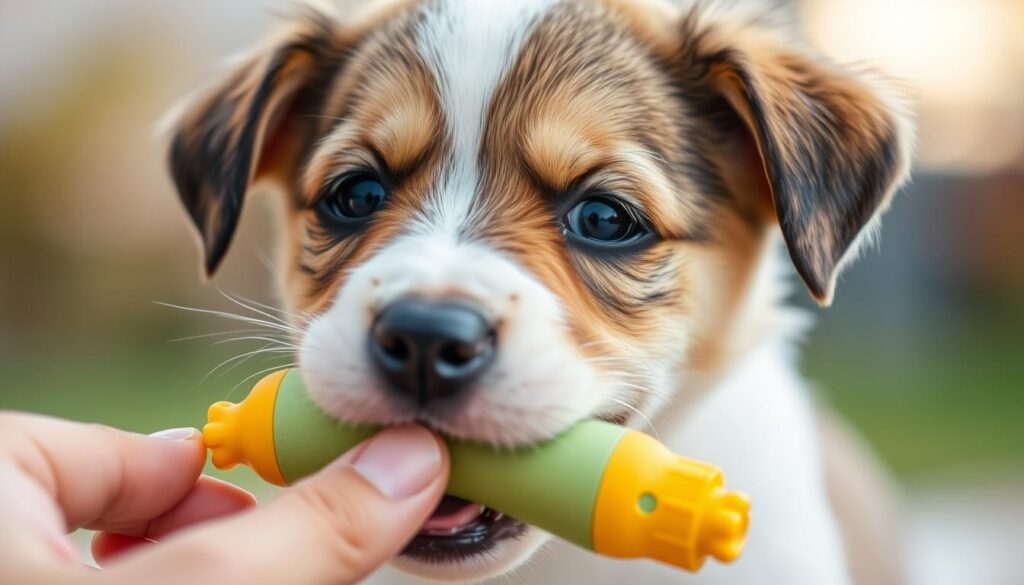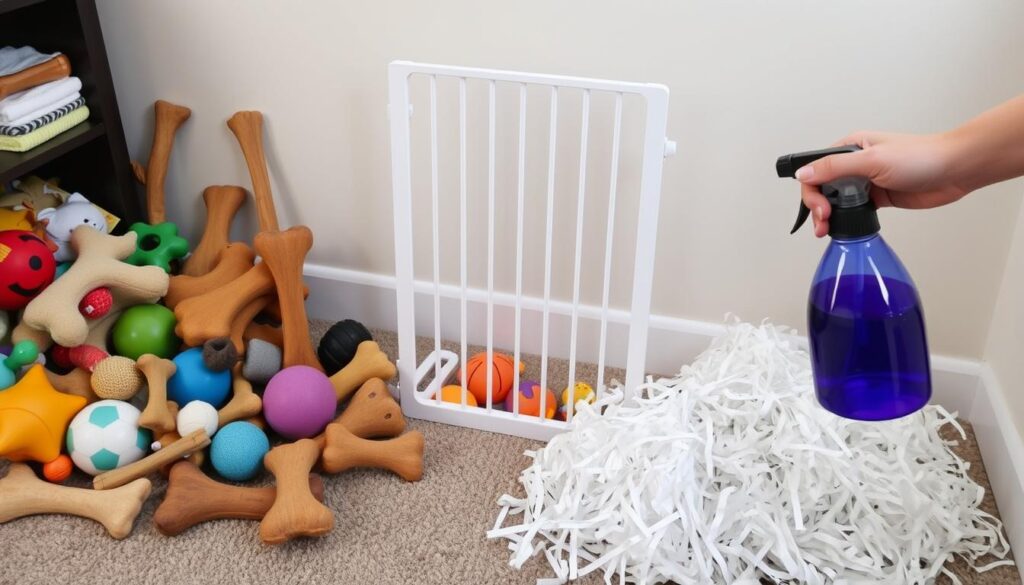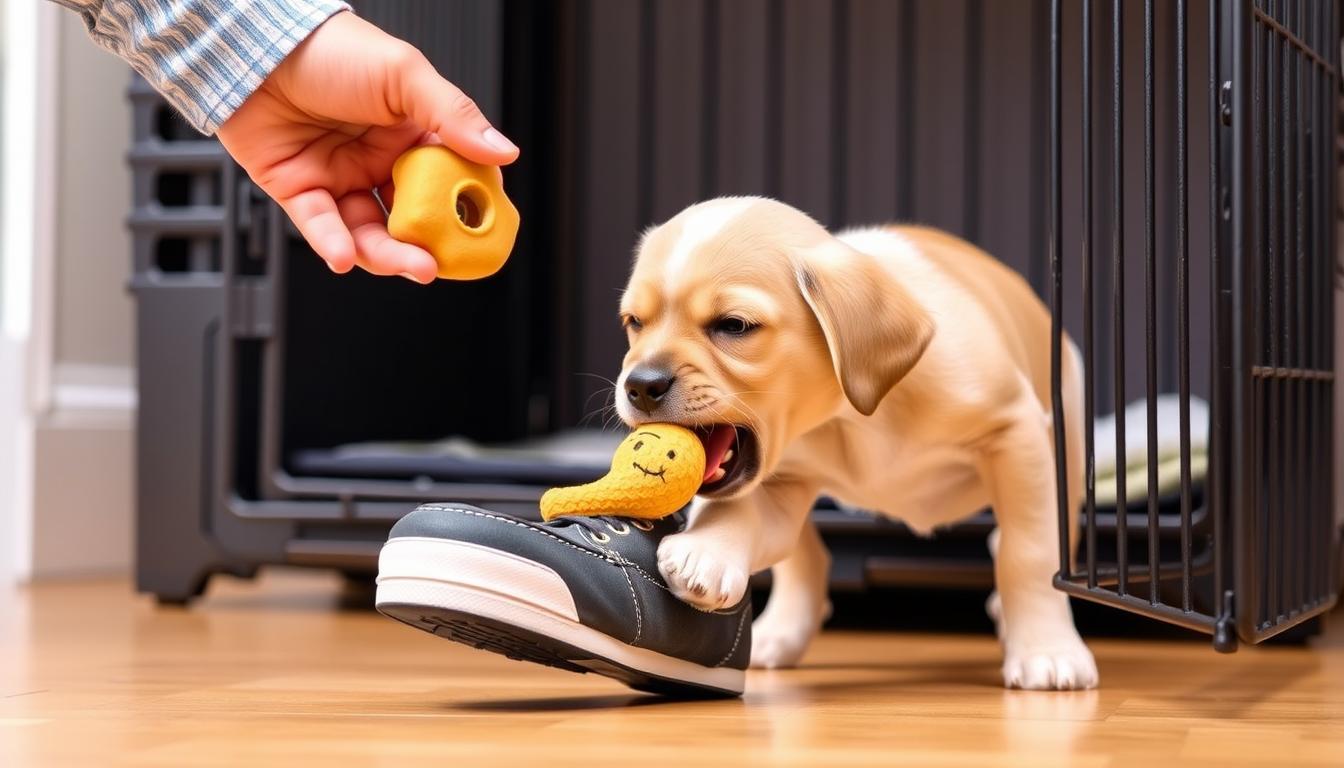When I first got a new puppy, the excitement was huge. But soon, biting became a big challenge. I learned that it’s not just about stopping the bites. It’s about building a strong, positive bond with my pet.
Many pet owners face this issue, knowing that puppies usually stop biting around six months old. Training can help teach them important skills and burn off energy1. Every day was a chance for us both to learn.
This article will share easy, effective ways to stop puppy biting. I used positive reinforcement and gentle guidance. I learned that socializing with other dogs helps teach good manners1. And, I found out that negative reinforcement can actually hurt more than help2.
Join me as we explore how to make our puppy happy and well-adjusted with the right training.
Key Takeaways
- Understanding the reasons for biting helps in addressing the behavior.
- Incorporating training into daily routines can burn energy effectively.
- Socializing with other dogs promotes positive mouth behavior.
- Using positive reinforcement is crucial to successful puppy training.
- Immediate response to biting during playtime is key for consistency.
Understanding Why Puppies Bite
Puppies bite for many reasons, like natural behaviors as they grow and check out their world. Knowing why they bite helps us stop it from happening.
The Exploration Phase
At seven weeks old, puppies start to mouth things to learn about their world. This is key for them to feel and understand different textures and sensations.
The Teething Process
When puppies are three to four months old, they start teething. This makes them want to chew on things, including people3. Biting gets worse around 13 weeks as their adult teeth come in4.
Playful Behavior
Playful biting helps puppies talk to other dogs. They learn to bite gently through play with friends3.
Seeking Attention
Puppies bite to get their owner’s attention. It means they want to play or feel left out.
Anxiety or Fear Responses
Some puppies bite because they’re anxious or scared. This can happen if they’re frustrated or not handled right3. Giving them positive attention and playing without touching can help.
Teach Your Puppy Bite Inhibition
Teaching your puppy not to bite too hard is key to safe play. It helps prevent serious bites as they grow. Puppies that learn this are less likely to bite as adults5. This training helps them understand how hard they should bite, since their mouths are full of tiny teeth5.
The Importance of Bite Inhibition
Good bite inhibition can stop a minor nip from becoming a serious bite6. A trained puppy knows how to play safely with other dogs6. Being patient and consistent is crucial in teaching this skill5. Using positive rewards like praise or treats helps a lot5.
How to Practice Bite Inhibition
Start teaching bite inhibition by four and a half months old7. If your puppy bites too hard, say “ow!” loudly7. If they keep biting, stop playing for 30 seconds and ignore them7. Gradually teach them to bite gently by setting limits on how hard they can bite7.

If your puppy bites too much, use a time-out in a safe area7. Having a chew toy available can also help stop unwanted biting5.
Strategies for Controlling Puppy Biting
Dealing with puppy biting is crucial. Puppies chew and mouth to explore their world. Using the right strategies helps stop unwanted biting and encourages good behavior. Here are some effective ways to stop puppy biting.
Use of Toys for Diversion
Offering the right toys helps distract a puppy from biting. Toys made from safe materials encourage healthy chewing. Using old beach towels or jeans can also work well8. Give the puppy lots of praise when it chooses a toy over biting, to encourage good behavior.
Time-Outs as a Teaching Tool
Time-outs are a useful training tool. If a puppy bites, a brief time-out shows it’s not allowed. This helps the puppy calm down and think about its actions. Being consistent with time-outs helps the puppy learn not to bite9.
Preventing Overstimulation
It’s important to keep a puppy’s environment calm. Too much excitement can make puppies bite more. Activities like fetch or tug-of-war help them use up energy and focus on the right things10. Watching the puppy’s activity and giving it quiet time can also help reduce biting.
Effective Ways to Stop Puppy Biting
Stopping puppy biting means learning different techniques that help with good behavior. Using positive reinforcement for puppies is a key method. I give my puppy treats or praise when they don’t bite during play. This makes them want to keep being good.
It’s key to give treats or praise when they play with toys instead of my hands. This way, I teach them that being gentle is better than biting. This method works well because it rewards good actions, not bad ones11.
Positive Reinforcement Techniques
During play, I distract my puppy with toys to stop biting. I keep them interested with different toys and change them often. Safe toys like rope, rubber, or soft ones are good for them to chew on.
Puppies chew more when they’re anxious or bored. So, they need lots of exercise and fun activities12. Playing gently with children helps reduce biting and makes a happy place for my puppy.
Calming Commands and Signals
Teaching my puppy commands like ‘sit’ or ‘down’ helps stop biting. These commands change their focus, especially when they’re too excited. A short timeout of 10 to 30 seconds can also help calm them down13.
By using these methods and praising good behavior, I create a calm play area. This teaches my puppy when it’s time to be gentle.

Stop Puppy Biting by Providing Alternatives
Managing puppy biting means giving them something else to do. Chew toys for puppies are great for this. They keep puppies busy and satisfy their need to chew, especially during teething. Puppies start teething around three to four months old and may bite more until they are six to seven months old1415. The right toys can help reduce biting on humans.
Offer Chew Toys
Choosing the right chew toys for puppies is key. Toys like rubber KONGs and ropes work well to stop chewing on things they shouldn’t15. Giving my puppy something to chew on helps them and keeps my stuff safe. It’s important to pick toys that fit my puppy’s size to avoid choking.
Frozen Treats for Teething Puppies
Frozen treats are a great way to ease teething pain and keep my puppy busy. These treats cool their gums and distract them from biting on me or my furniture. Offering different frozen treats like mashed sweet potatoes or yogurt keeps them mentally stimulated and rewards them16. These stop puppy biting alternatives teach my puppy what’s okay to bite and keep their mouth occupied.
Engage in Plenty of Playtime
Playing with puppies is key for their growth and good behavior. Structured play helps them use up energy, preventing bad habits like biting. By playing interactive games, I strengthen our bond and teach them good habits.
Structured Play Sessions
Planning play for puppies means picking activities that use their energy and keep their minds sharp. I set aside time each day for games that match my puppy’s energy and curiosity. Using dog training exercises during these times helps with behavior and managing their actions. Experts say puppies need breaks of 5 to 15 minutes to calm down, based on their age and play intensity17. This helps my puppy learn boundaries while still having fun.
Interactive Games to Use
Games like fetch, tug-of-war, and hide-and-seek are great for puppy playtime. They’re fun and teach important skills like controlling impulses and social skills. Playing with my puppy shows he prefers toys over biting my hands, stopping bad behavior18. Setting safe play rules also stops aggressive behavior, which can start around 10 to 14 weeks old19. This way, playtime is positive and doesn’t lead to biting.
Managing Your Puppy’s Environment
It’s crucial to manage your puppy’s environment to stop unwanted biting. Create a safe space for them to explore without fear. A crate or playpen is a great way to keep them safe when they’re too excited or overwhelmed.
Using a Crate or Playpen
A crate or playpen gives your puppy a safe spot. It limits where they can go and keeps them away from dangers at home. Puppies often bite and mouth as they learn about their world20. They might bite hands or clothes as a form of play20. Using a crate helps teach them good habits and stops bad ones.
Creating a Safe Play Area
Make sure your puppy’s play area is safe from harmful items. Add toys that are right for their age to keep them from biting things they shouldn’t21. The place where a puppy lives affects their behavior. Puppies without enough exercise in cities might act out because they’re not getting enough to do21.
Socializing Your Puppy for Better Behavior
Socializing puppies is key to their training and growth. It helps them behave well as they get older. Puppy classes offer many benefits. They teach puppies how to be friendly with other dogs and build good social habits.
The Benefits of Puppy Classes
Puppy classes give young dogs a safe place to learn. They learn about bite control and how to act around others. This is important because puppies can only learn to be social until they are about 16 weeks old22.
Dr. Ian Dunbar found that dogs that learn bite inhibition are less likely to bite severely23. These classes have supervised playtime with adult dogs. This helps puppies learn social rules and avoid biting too much. Commands like ‘sit’, ‘stay’, and ‘come’ also help puppies behave better and build trust with their owners22.
Encouraging Interaction with Other Dogs
It’s important to get puppies to interact with other dogs. This makes them better at playing and less likely to be scared or aggressive as adults22. Meeting different breeds helps them understand dog language early. Safe and positive training helps puppies control their biting, leading to better behavior later.
By socializing my puppy, I’m helping them behave better and live a happier life.
Using Deterrents and Time-Outs
Using deterrents and time-outs is key to training puppies. These methods teach them right from wrong and stop them from biting. They make sure puppies know what they can and can’t do.
Bitter Sprays for Chewing
Bitter sprays are a common way to stop puppies from biting. They taste bad and keep puppies away from chewing on things they shouldn’t. It’s important to pick a spray that’s safe for pets. This way, you avoid hurting your puppy.
Using bitter sprays works well with positive rewards. Together, they help stop puppies from chewing on things they shouldn’t.
Time-Outs for Unacceptable Biting
Time-outs teach puppies that biting means no play. When a puppy bites, I stop playing with them and put them in a quiet spot for a bit. This teaches them that biting takes away fun and friends24.
For the best results, time-outs should always be the same. They’re part of understanding each other. Remember, puppies bite because they’re exploring and learning about the world25. By giving them safe toys, we can change their biting into fun play.
Understanding When to Seek Professional Help
Finding the right time to get help for my puppy can be tough. I need to watch for signs of puppy behavior issues that show I should get more training. These signs include biting a lot even after training, which means there’s a deeper issue.
Signs Your Puppy Needs Additional Training
Puppies often bite because they’re exploring with their mouths26. If my puppy starts biting from fear or anger, it’s a clear sign I need help27. If biting keeps happening or gets worse, it means my training isn’t working. It’s time to change how I train27.
Finding a Qualified Dog Trainer
Getting a dog trainer who knows about puppy behavior can really help. Positive reinforcement is a great way to train, and a good trainer uses it to cut down on biting26. When looking for a trainer, check their qualifications, experience, and training style. They should match my goals. Their advice can help manage biting and help my puppy grow up healthy28.
Conclusion
Understanding why puppies bite is key to solving the problem. Puppies chew on things to ease the pain of teething, which lasts about two to three months. It’s important to start training early, around 18 weeks, to stop bad habits before they start2930.
By giving them safe things to chew on and playing with them in a structured way, I can teach my puppy what’s okay to bite. Studies show that praising good behavior helps them learn faster. On the other hand, punishing them can make them scared and aggressive29.
The aim is to create a safe space for my puppy to grow and be happy. Playing games like tug-of-war helps them control their impulses and bite less. This makes our time together better and more fun30.
FAQ
How can I stop puppy biting effectively?
What causes puppies to bite?
What is bite inhibition, and why is it important?
What toys are best for my puppy to prevent biting?
How often should I socialize my puppy?
When should I seek professional help for my puppy’s biting?
Are there specific commands I can teach my puppy to help with biting?
Is using deterrent sprays effective for stopping biting?
Source Links
- How To Teach Your Puppy To Stop Biting | Eukanuba – https://www.eukanuba.com/us/puppy/puppy-articles/how-to-teach-your-puppy-to-stop-biting
- Teaching Your Puppy Not to Nip: 6 Tips to Stop the Biting – Old Farm Veterinary Hospital – https://www.oldfarmvet.com/teaching-your-puppy-not-to-nip-6-tips-to-stop-the-biting/
- Mouthing, Nipping and Biting in Puppies – https://www.aspca.org/pet-care/dog-care/common-dog-behavior-issues/mouthing-nipping-and-biting-puppies
- How To Stop a Puppy From Biting – https://www.petmd.com/dog/training/puppy-biting
- No title found – https://www.akc.org/expert-advice/training/stop-puppy-biting/
- How to Train Your Puppy Not to Bite Hard – https://www.thesprucepets.com/bite-inhibition-training-for-puppies-1118223
- Mouthy Pups – It’s Normal. Let’s Teach Them Bite Inhibition. – Seattle Humane – https://www.seattlehumane.org/resources/mouthy-pups-its-normal-lets-teach-them-bite-inhibition/
- 4 Puppy Biting Survival Strategies – Whole Dog Journal – https://www.whole-dog-journal.com/behavior/4-puppy-biting-survival-strategies/
- No title found – https://www.akc.org/expert-advice/training/puppy-mouthing-expert-tips/
- How To Train Your Puppy Not To Bite You – https://www.familypupz.com/blog-2/how-to-train-a-puppy-not-to-bite-you
- How To Cope With Puppy Biting – https://www.medivetgroup.com/pet-care/pet-advice/how-to-cope-with-puppy-biting/
- How to stop your dog chewing and mouthing | Dogs Trust – https://www.dogstrust.org.uk/dog-advice/training/unwanted-behaviours/stop-your-dog-chewing-mouthing
- Safe and Humane Ways to Teach Your Puppy How to Stop Biting – https://www.pupbox.com/training/safe-humane-ways-teach-puppy-stop-biting/
- Dog Trainer Tips: Puppy Nipping and Biting | Preventive Vet – https://www.preventivevet.com/dogs/puppy-nipping-and-biting
- How to stop puppy biting: everything you need to know – https://www.petplan.co.uk/pet-information/puppy/advice/puppy-biting/
- How To Stop A Puppy Biting | 6 simple tips – Bella & Duke – https://www.bellaandduke.com/learn/dog-behaviour/how-to-stop-a-puppy-biting/?srsltid=AfmBOop_y1V8rjPSGuCets6eYKLVss0Zj_tIhwkTaa6Zywm24P0pr48e
- Puppy Play Biting — DogZenergy – https://dogzenergy.com/blog/puppy-play-biting
- Puppy Biting: How to get this annoying behavior to stop – https://www.pumpkin.care/blog/puppy-biting/
- Puppies Bite. Deal with it. – https://aniedireland.com/2020/09/21/puppiesbite/
- Living With “Jaws”: A Survival Guide For Puppy Mouthing – https://www.drjensdogblog.com/living-with-jaws-a-survival-guide-for-puppy-mouthing/
- Puppy Biting Training – Sea Dog Kennel – https://pwdpuppies.com/puppy-biting-training/
- Puppy Behavior & Socialization | Lawndale Veterinary Hospital – https://lawndalevets.com/paws-to-protect/puppies/puppy-behavior-socialization/
- Puppy Socialization: Bite Inhibition – East Valley K9 Services – https://eastvalleyk9.com/puppy-socialization-bite-inhibition/
- Nipping/Mouthing — Tailored Dog Training – https://www.tailoreddogtraining.com/blog/2017/2/19/nippingmouthing
- Puppy Biting: Why Nothing You Try to Stop the Biting Works – https://www.3lostdogs.com/puppy-biting-why-nothing-you-try-to-stop-the-biting-works/
- How to Stop Puppy Biting – Montgomery Veterinary Associates – https://mvavets.com/how-to-stop-puppy-biting/
- 6 Proven Puppy Bite Training – Upstate Canine Academy – https://www.upstatecanine.com/blog/6-proven-methods-for-teaching-your-puppy-not-to-bite/
- When Will My Puppy Stop Biting? Professional trainer explains – Rebarkable – https://rebarkable.com/when-will-my-puppy-stop-biting-professional-trainer-explains/
- All About Puppy Biting – The Do’s and Don’ts – PAWS Bed & Biscuit – https://pawsbedandbiscuit.com/all-about-puppy-biting-the-dos-and-donts
- Ask Crystal: Mouthy Puppy – Blue Ridge Humane Society – https://www.blueridgehumane.org/puppy-biting-stages/
